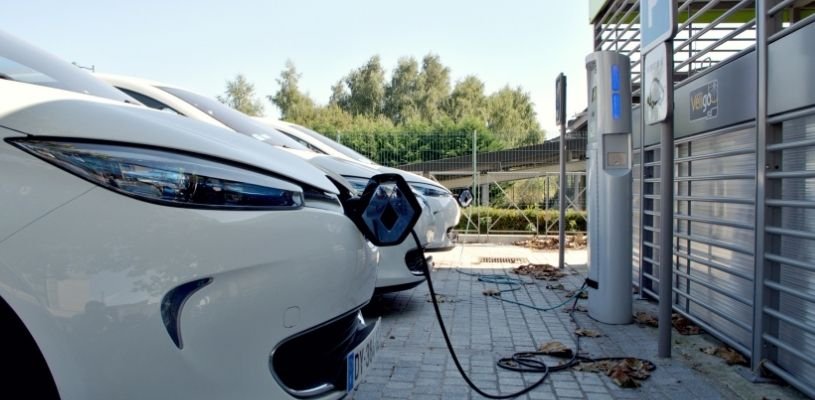
When the conversation of electric cars comes up, charging time is one of the biggest topics. Those who drive petrol and diesel cars can remain sceptical on the range of electric vehicles, as they are very used to filling up everywhere when they need to. That fear of being stranded in the middle of nowhere with an electric car remains. However, with rapid charging, this can be avoided.
Rapid chargers are still pretty rare, so what options are available for most people? Here we explore all the charging methods available and give you a better idea of how long it takes to charge an electric car.
Related: How Does an Electric Car Work?
Electric Car Charging Methods
There are a few methods of charging electric cars. Here, we outline some of them:
Slow Charging
The longest method of charging cars is slow charging, which can take bigger EVs up to 24 hours to charge fully. Something smaller, like a Nissan Leaf, with a 40kWh battery, requires 12 hours to get a full battery. Slow charging ports usually run at 3kW and are still occasionally found at public charging stations, but are more often than the portable type with a three-pin plug for use for charging at home.
Most electric cars come with a home charging unit as standard, but as batteries continue to get bigger, manufacturers recommend slow charging as a last resort. However, if you don’t drive many miles a day, slow charging is the best method for topping up your car overnight. The slow rate of charge means not as much heat is generated during the process, helping it prolong battery life.
Fast Charging
The most popular method of charging, especially in domestic settings, is fast charging. Fast chargers run at either 7kW or 22kW, with the latter usually found at public charging stations. Most domestic wall boxes run at the lower 7kW rate, which halves the waiting time compared to a slow charger. This means a Nissan Leaf with a 40kW battery can be fully charged within six hours. A Tesla with a 75kW battery takes about 12 hours.
A 22kW charging pod needs a three-phase electricity supply, making them an incredibly rare and expensive solution in the home. The car must also accept Direct Current (DC) and Alternating Current (AC) charging methods. If your EV can accept this higher rate of charge, then expect your charging time to be slashed in half compared to the 7kW unit - meaning a 75kW Tesla can charge in under six hours.
Rapid Charging
By far the fastest way of topping up EV batteries is rapid charging. Some rapid chargers can deliver a huge amount of energy in just 20 minutes. These chargers are usually found at motorway service stations and dedicated charging hubs can charge anything between 50kW and 350kW.
To make the most of rapid charging, you will need a car that can handle DC charging. For the best results, you will only charge up to 80% of your battery’s capacity, as beyond that the charge slows to protect the cells from high temperatures.
The majority of entry level EV models are available with an optional upgrade for DC charging of up to 100kW. More expensive EVs such as a Tesla Model 3 or Model S charge up to 250kW.
Top-Up Charging
For the majority of drivers, top-up charging is the go-to method for charging an electric vehicle. Most drivers will charge their car whenever they park it, whether that’s at home or during the day at supermarkets, shopping malls, workplace, etc.
Top-up chargers make use of the time their car is parked to keep the battery topped up instead of letting the battery run empty and waiting for it to fully recharge. Most public charging points range from 7kW to 22kW, which are perfect for top up charging.
By combining daytime top-up charging with overnight charging in the home offers drivers the most effective way to keep an electric car charged up and ready for journeys.
Range Per Hour of Charging
It’s important to know how far you’ll be able to travel on the charge you put in. Here is a list of the miles of range added per hour of charging:
-
3.7kW Slow = Up to 15 miles
-
7kW Fast = Up to 30 miles
-
22kW fast = Up to 90 miles
-
43-50kW = Up to 90 miles in 30 minutes
-
150kW = Up to 200 miles in 30 minutes
Your range per hour differs depending on the efficiency of your car. Small full battery electric cars, such as the Renault Zoe, are most efficient and get 30 miles of range per hour when charged at 7kW.
The biggest full electric cars, including an Audi e-tron Quattro, are heavier and get around 20 miles of range per hour on a 7kW charge.
Related: How Much Does it Cost to Charge an Electric Car?
Factors That Affect Charging Speed
There are five factors that affect your charging speed:
-
Size of battery: The bigger battery capacity, the longer it takes to charge.
-
State of battery: Charging from empty takes longer than topping up a charge of a battery at 50% or higher.
-
Maximum charging rate of the car: You can only charge your electric car at the maximum charge rate it will accept. Even plugging in your car at a higher rate charge point won’t make it faster than what it can do.
-
Max charging rate at charge point: The time it takes to charge your car will be decided by the max charging rate of the charge point you use. Even if you have a battery that can charge at 22kW, it will only charge at 7kW at a 7kW charge point.
-
Environmental factors: Electric cars are more efficient and get better range per hour in the summer than they do in winter. Colder temperatures also mean it takes slightly longer to charge, even when using a rapid charger.
In Summary
The time it takes to charge an electric car varies starting from as little as 30 minutes right up to more than 12 hours. This will depend on the size of the battery in the car and the speed of the charging point.
-
A typical electric car with a 60kWh battery takes just under 8 hours to charge from empty-to-full from a 7kW charging point.
-
A lot of drivers choose to top up their battery rather than recharging it to full.
-
For many electric cars, you can add 100 miles of range in just 35 minutes when using a 50kW rapid charging point.
-
The bigger battery in the car and the slower the charging points, the longer it takes to fully charge your car.
Nationwide Cars have a wide selection of electric cars available to buy. You can browse our range of cars online - from the Jaguar I-Pace to the BMW i3 - and ask for more information by contacting us today.


